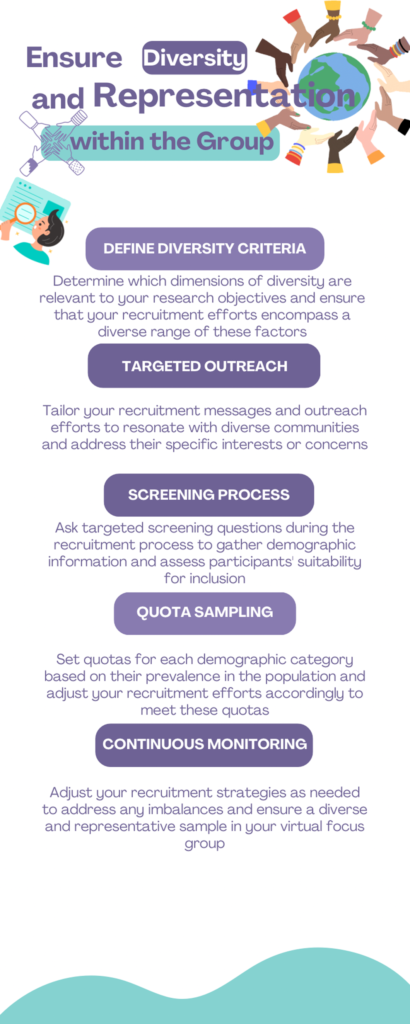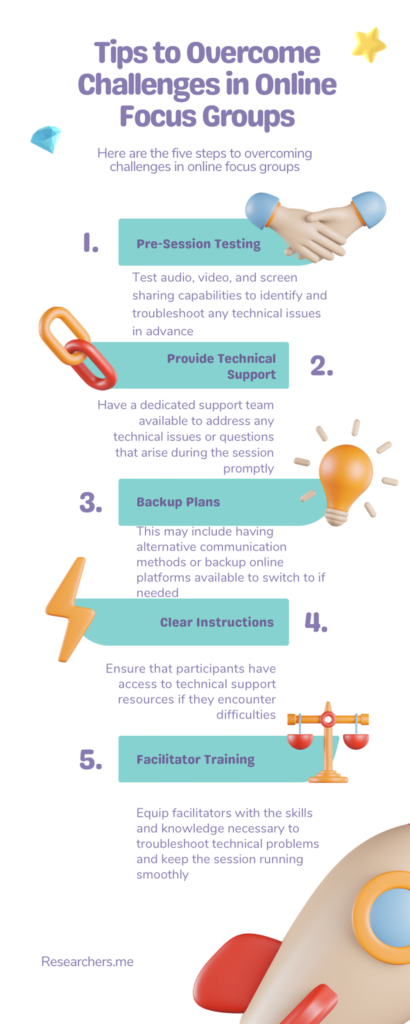Online focus groups were made popular by the COVID-19 pandemic. Every industry was seeking an alternative to remain active. Going virtual saved a lot of businesses.
Conference meetings and transactions were now held online. It gave people a safety net to express themselves more honestly. This is also means that if you were going to experiment with an online focus group, you will reach a wider audience with unbiased opinions.
Focus groups nurture interactive discussions among a small group of participants. They provide rich qualitative data that uncovers insights. Bringing together individuals with diverse backgrounds and perspectives offer a holistic understanding of your audience’s preferences.
This article presents you with all you need to know about online focus groups. It also equips you with how you can successfully carry out one all by yourself.
What Purpose Does an Online Focus Group Serve?
Focus groups are qualitative research methods used to gather insights, opinions, and perceptions from a small group of participants. It is always about a specific topic, product, or service. The purpose of focus groups is to dive deep into the thoughts, feelings, and attitudes of your audience. This helps you uncover insights that you would not have seen using quantitative methods alone.
These insights inform your product development, and business decisions. The best part is, your consumers influenced this decision. So, the changes made are always the right ones!
Why Do You Need to Carry out an Online Focus Group Study?
A survey was carried out in 2014 by Zwaanswijk and van Dulmen titled: Advantages of asynchronous online focus groups and face-to-face focus groups as perceived by child, adolescent and adult participants: a survey study.
According to the survey, 78.4% of adults found it easier to engage in group discussions when there was personal contact. Only 4.8% of children and 17.7% of adolescents shared the same perception. Yes, that’s a win for face-to-face focus groups. But drawing out honest insights is a lot more tedious with a physical group.
Here are some of the perks of organizing an online focus group:
Online Focus Groups Eliminate Geographical Barriers
Focus groups allow participants from diverse locations to partake without the need for travel. 69.1% of participants found it advantageous to join discussions from the comfort of their homes.
Participants join online focus groups from the comfort of their own homes or offices. It eliminates the need for scheduling and logistics associated with in-person meetings. This reduces dropout rates from your organized group survey.
Online Focus Groups Are More Cost-Effective
Online focus groups eliminate expenses related to venue rental, travel, and of course, catering. This makes virtual focus groups an attractive option for businesses with limited budgets.
Online Focus Groups Allow for Flexibility
According to the same study by Zwaanswijk and van Dulmen, 90.5% of adolescents and 95.9% of adults appreciated the flexibility of participating at their own convenience.
Online focus groups offer greater flexibility in terms of scheduling. You get to conduct sessions at times convenient across different time zones. This flexibility increases the accessibility of focus groups and ensures broader participation.
Online Focus Groups Are Anonymous
Participants feel more comfortable expressing their opinions when their anonymity is assured. They’ll even share sensitive information with you if they feel secure enough.
This gives you the chance to harvest honest feedback from your audience.
How to Plan Your Online Focus Group?
Here are some of the steps you need to take when you need to design your own online focus group.
Step 1: Define Your Research Objectives
Clearly outline the goals and objectives of your focus group. What specific insights are you seeking to gain? What questions do you want to address? Understanding your objectives guides the rest of the planning process.
Step 2: Identify Your Target Participants
Determine the characteristics and demographics of the participants you wish to include in your focus group. Consider factors such as age, gender, location, occupation, and purchasing behavior.
Ensure that your target participants align with the objectives of your research.
Step 3: Set the Criteria for Your Participant Recruitment
Establish criteria for recruiting participants based on your target demographics and objectives. Determine the number of participants needed and the criteria for inclusion to ensure a diverse and representative sample.
Step 4: Develop Discussion Topics
Create a list of discussion topics and questions that will guide the conversation during the focus group. These topics should align with your research objectives. They should be designed to elicit the insights you are seeking from participants.
How to Recruit Participants for Virtual Focus Groups?
Here are the steps that will guide you on recruiting a diverse and informative focus group:
Make Use of Online Platforms
Leverage social media platforms, online forums, and community groups to access your audience. Advertise your focus group on these platforms and recruit participants.
Check out LinkedIn, Facebook, Twitter, and Reddit. They are quite effective for reaching potential participants.
Use Email Lists and Newsletters
Reach out to your existing email subscribers, customers, or contacts. Invite them to participate in your virtual Focus Group.
Send personalized email invitations with clear instructions on how to join and participate.
Use Your Professional Networks
Contact your professional networks and industry associations related to your research topic. This helps you recruit participants with relevant expertise or experience.
Reach out to relevant organizations and request assistance in promoting your focus group through their networks.
Make Incentives and Rewards Available to Participants
Incentives encourage recruits to participate in your virtual focus group. This could include cash incentives, gift cards, discounts, or free products/services.
Clearly communicate the incentive structure in your recruitment messages.
Referral Programs
Existing participants refer friends, colleagues, or acquaintances to join the focus group. Offer incentives to successful referrals. This gives them a reason to help you expand your participant pool.


Conclusion
Online focus groups offer a flexible and efficient way to gather valuable insights from participants. Overcoming technical challenges and ensuring confidentiality allows you to harness the power of virtual focus groups. Start today, inform your decision-making processes to drive success.
Take the next step in your research journey with Researchers.me, where cutting-edge tools and expert guidance await. Elevate your research efforts and stay ahead of the competition. Start your journey with Researchers.me today!

